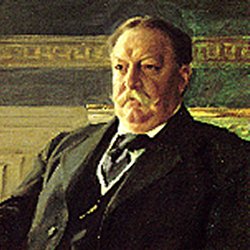Taft's Dollar Diplomacy

Taft became President after Roosevelt. While agreeing with the overall policies of the Roosevelt administration, Taft felt that the power of the Presidency had been extended too far by the previous administration. Taft exerted his power to a much lesser degree. Often that was deemed by the progressive Roosevelt supporters as an abandonment of principles. Thus a major rift developed in the Republican party.
Taft was committed to lowering tariffs, and when elected, he called Congress into a special session to this end. Congress succeeding in reducing the average tariff from 46 to 41 percent. However, special interest groups managed to raise the tariff on several items. Taft was an avid enforcer of the anti-trust policies of the Roosevelt administration. He repeatedly instituted the number of anti-trust suits brought against monopolist corporations. During his term of office, two of the biggest monopolies were broken - Standard Oil Company and the American Tobacco Company. Under Taft, the federal government for the first time began the regulation of the telephone and telegraph industries. The government also obtained the authority to fix interstate commerce rates.
Taft maintained an activist approach to foreign policy. On one hand, he was the initiator of what became known as Dollar Diplomacy, in which the United States used its military might to promote American business interests abroad. Taft defended his Dollar Diplomacy as an extension of the Monroe Doctrine. Taft was a major supporter of arbitration as the most viable method of settling international disputes.
After his defeat in the election of 1912, Taft went on to become Chief Justice of the Supreme Court, a position he found more satisfying than the Presidency.
Taft was committed to lowering tariffs, and when elected, he called Congress into a special session to this end. Congress succeeding in reducing the average tariff from 46 to 41 percent. However, special interest groups managed to raise the tariff on several items. Taft was an avid enforcer of the anti-trust policies of the Roosevelt administration. He repeatedly instituted the number of anti-trust suits brought against monopolist corporations. During his term of office, two of the biggest monopolies were broken - Standard Oil Company and the American Tobacco Company. Under Taft, the federal government for the first time began the regulation of the telephone and telegraph industries. The government also obtained the authority to fix interstate commerce rates.
Taft maintained an activist approach to foreign policy. On one hand, he was the initiator of what became known as Dollar Diplomacy, in which the United States used its military might to promote American business interests abroad. Taft defended his Dollar Diplomacy as an extension of the Monroe Doctrine. Taft was a major supporter of arbitration as the most viable method of settling international disputes.
After his defeat in the election of 1912, Taft went on to become Chief Justice of the Supreme Court, a position he found more satisfying than the Presidency.
